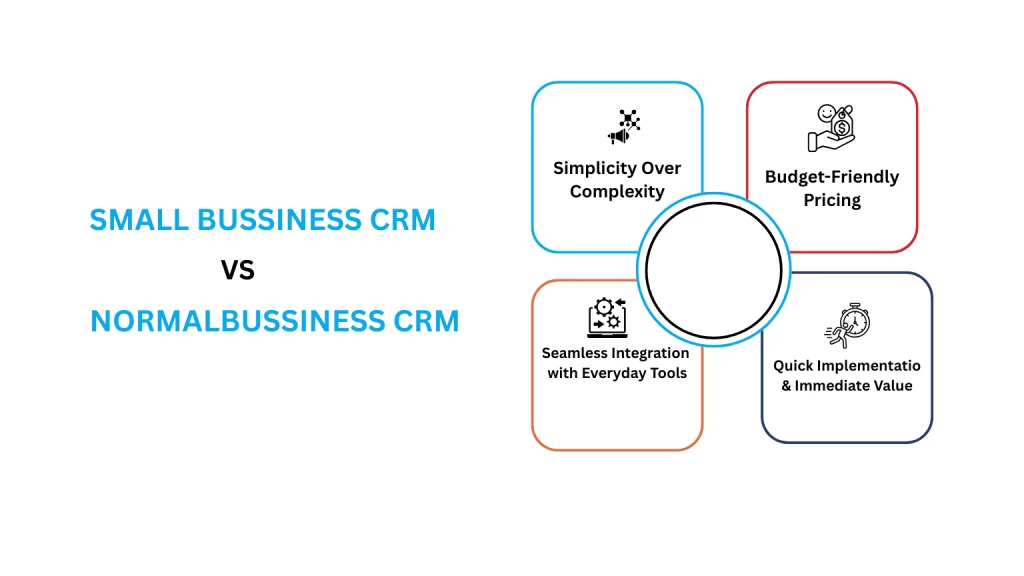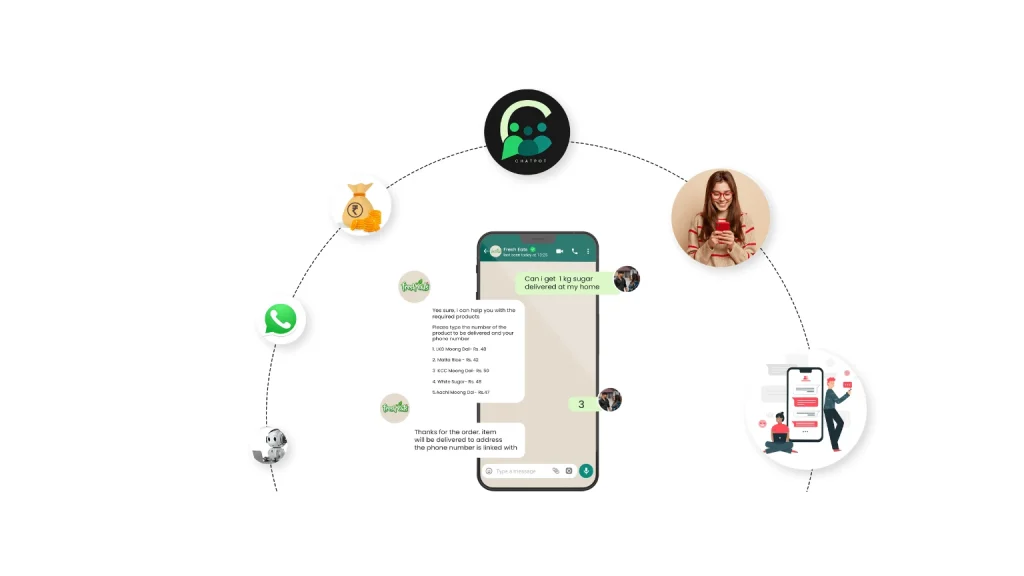custom CRM software | REAL ESTATE CRM| mARKETING AUTOMATION| Custom CRM Software | Lead managment
introduction
Customer relationship management (CRM) software is no longer the privilege of large businesses. For small businesses, CRM software is becoming an essential tool that simplifies operations, enhances customer interaction, and boosts growth. The correct selection of the best CRM for small businesses can significantly contribute to your day-to-day operations and future success.
This article will walk you through the top CRM solutions for small businesses, highlight their key differences, and explain why they are perfect choices for growing businesses in 2025. We will also cover what distinguishes small business CRMS from regular CRMS, and provide some valuable tips on how to choose the best CRM for your needs.
Small Business CRM vs. Normal CRM: What’s The Difference?

Let us understand what makes a CRM for a small business unique compared to a regular CRM solution.
CRM software is intended to help companies manage customer relationships, track sales activities, and improve customer service in general. But what a small business requires is not the same as what an enterprise does. Here’s why:
Simplicity Over Complexity
Small businesses need a CRM that is easy to use and does not require much training or an IT department to manage. Legacy CRMs, however, tend to have more complexity in their features that might be unnecessary for small businesses.
Budget-Friendly Pricing
Small enterprises typically operate with smaller budgets, thus, the best CRM for small businesses should offer flexible pricing plans and be cost-effectively priced without compromising fundamental functions.
The majority of day-to-day CRM solutions are designed to cater to larger companies, thus, the products will be expensive and loaded with functions that may not suit the smaller organisations to their fullest extent.
Seamless Integration with Everyday Tools
Small businesses typically rely on basic tools like Gmail, Google Calendar, and other simple solutions for their processes.
A CRM in a small business should be capable of smoothly integrating with these tools so that there can be easier data handling as well as communication. Regular CRMS may prioritise advanced integrations that are not so critical for small businesses.
Quick Implementation & Immediate Value
For small businesses, the best CRM should be straightforward to implement with minimal configuration.
Average CRM software, especially that intended for enterprises, can take longer to implement, which could be unrealistic for small businesses seeking instant results.
How Does CRM Help Small Business Owners?
CRM software offers a bouquet of benefits to small business owners. CRM provides the opportunity to wave goodbye to spreadsheet chaos: from improved customer communication to increased sales, fantasies unfold on how a small business might operate under a CRM.
1.Say Goodbye to Spreadsheet Chaos
As a small business owner, you might be all too familiar with keeping track of customer data, sales, and interactions on spreadsheets. It seems convenient initially but later becomes a nightmare with your business expansion. A CRM brings it all on one platform for easy accessibility, updating, and management.
2. Automate Customer Follow-Up
The best thing about CRM is that it helps automate the process. With a CRM solution, you can automate lead nurturing, meeting reminders, and follow-up emails, hence saving time and letting no customer or lead fall between the cracks.
3. Define High-Value Customers and Sales Opportunities
The CRM will track actions, purchases, and client interactions to identify the highest-value customers and sales opportunities. With this information, you can begin tailoring your sales and marketing strategies toward those high-value clients, thus benefiting customer experience and your bottom line.
4. AI-Powered Insights for Smarter Decision-Making
The kind of CRMS available now has AI integrated that shows you customer activity, market trends, and sales projections.
5. Save Time on Repetitive Tasks
CRMS are capable of automating mundane activities that involve a lot of repetition, such as data entry, making follow-ups, or drawing up reports. As a result, one would have had more time for more strategic activities, perhaps nurturing relationships with clients or brainstorming for a new business concept.
6. Increase Revenue with Better Customer Retention
Good CRM keeps you on top of your customer relationships. For example, it will provide reminders for you to check in and to send personalised offers or support. With such tools at hand, customer retention can be uplifted and repeat business encouraged.
Features to Look for in CRM Software for Small Businesses
There are certain features to look for when choosing the best CRM for a small business. These features could greatly influence how you manage your business efficiently and scale the operations.
1. Usability
The best CRM for small businesses offers an intuitive interface that is easy to use with little or no training. You should be able to open it and start working right away, given the simplicity of its design.
2. Customizability
Customisation is key for small businesses. The best CRM allows you to mould the software to fit your particular requirements, whether that’s adjusting the sales pipeline, adding custom fields, or generating custom reports. Having a flexible CRM means the power to decide how your business operates rests within your hands.
3.Automation
Consider CRMS that offer automation features such as auto-respond emails, task reminders, and lead scoring. Automating gives you a lesser amount of manual work
4. Integration
Your CRM needs to integrate with the tools already in use, such as email platforms, accounting software, or social media apps. A CRM that integrates perfectly with other tools will allow for a smooth workflow and data consistency across all channels.
5.Scalability
It should scale with you as your business grows. A CRM should be able to accept more contacts, sales, and support requests, so that the scaling does not degrade performance. Scale means that, as your business grows, you would not need a new system.
5.Customer Support
Good customer support is paramount, especially for small setups that may not have dedicated IT support. See to it that your choice offers 24/7 customer support with live chat and a good help documentation system to guide you all the way through.
6.Analytics and Reporting
Data analytics is crucial in understanding one’s business performance. The most suitable CRM system for small firms should contain reporting and analytics features that will allow you to track your sales, observe customer behaviour, and measure the growth of your business over time.
7.Mobile Accessibility
Mobile access to your CRM is essential mainly for small business owners who are usually outside the office. It would be best to look for a CRM with a full-featured mobile app so you can even update and access customer information anywhere.
Bonus: Social Media Tools

1.Social media tools help you schedule posts, track engagement, and analyze performance across multiple platforms—saving time while maximizing reach.
2.From content planning to analytics, social media tools empower brands to stay consistent, build community, and grow faster online.
3.Whether you’re managing one account or many, social media tools offer automation, insights, and smarter strategies to boost your online presence.
4.With the right social media tool, you can simplify content creation, monitor real-time performance, and turn followers into loyal customers.
5.Social media tools like Buffer, Hootsuite, and Later take the guesswork out of online marketing—making your brand’s voice heard loud and clear.
8.WhatsApp API Integration

WhatsApp API Integration allows businesses to connect their CRM directly with WhatsApp, enabling automated messaging, lead capture, and real-time customer interactions—all from one centralized dashboard.
With WhatsApp Business API, you can send personalized property updates, automate follow-ups, and respond to queries instantly, making your communication faster and more effective.
Seamlessly integrate WhatsApp into your customer journey to boost engagement, streamline workflows, and improve lead conversion rates.
How to Consider When Choosing the Right CRM for My Small Business?
Choosing the right CRM for your small business may seem daunting, but by simplifying the process into some simple steps, it can be made easier. Here is a simple process for choosing the right CRM:
1. Know Your Business Requirements
It’s important to understand your business requirements before you begin evaluating CRM options. What kind of CRM do you require? Is it for customer service or customer support? Is it for managing sales pipelines? Marketing automation? You must have a clear understanding of your requirements, as this will help you prioritise your required features.
2.Factor in Your Budget
It is easy to get drawn into the most feature-rich CRM, however, you must also think about your budget. Search for CRMS that offer flexible pricing plans and free trials. That way you can find the solution that suits your needs without committing to a plan beforehand.
3.Assess Usability
Usability is an essential part of the decision-making process. You will want to try a few different CRM products, investigate their interfaces, and determine which one is easiest to navigate. The objective is to select a CRM that does not require a great deal of trainin
4. Check Customer Reviews
Research customer reviews to see what other small business owners are saying about different CRMS. This can provide insight into some of the pros and cons of each product.
5.Check Integration
Be sure to check that the CRM will integrate with products you already use. Whether it’s email ordering, accounting, social media, etc, even small integrations will save you more time, and ultimately keep human error out of the picture.
Conclusion
Choosing the best CRM for a small business is an important decision that can help improve customer relationships, sales, and productivity. With the ideal CRM software, you can automate tasks, gain insights, and ultimately build a more efficient and streamlined business. Whether you choose HubSpot, Zoho CRM, or another option based on your business’s needs, size, budget, and opportunity for growth, it is important to assess your business’s unique buyer experience demands and capacities before making a choice.
FAQ
What is the best CRM for small businesses in 2025?
The best CRM is based on your current needs, There are many CRMS that have amazing functionality for small businesses, like HubSpot, Zoho CRM, and Freshsales, with specific features that focus on usability, automation, and cost effectiveness.
How much does CRM software for small businesses cost?
Pricing can be different for each software, but most CRMS will have pricing tiers available. For lots of small businesses will range from free to around $30 per user per month, with several options that have scalable pricing as your business grows.
Will CRM Software help me sell more?
Yes. A CRM software will help you manage leads, track customer interactions, and automate follow-ups. This will significantly increase your opportunities and conversion rates.
How long does it take to implement a CRM for a small business?
Like price, implementation can differ by software. But keep in mind, most small business CRM can be implemented and set up in a matter of days, if not a few weeks or months. Most CRMS have easy onboarding and implementation processes with guides and customer support at their disposal.
The post Best CRM for Small Business: A Comprehensive Guide for 2025 appeared first on Archiz Solutions.


